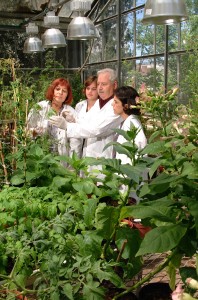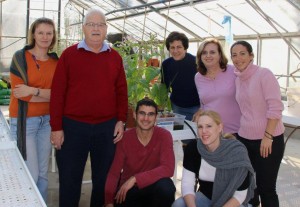Plant hormones play an important role in plant senescence and have a major impact on plant biomass. In our lab we succeeded to genetically manipulate the endogenous synthesis of cytokinins and as a result to delay the processes of plant and organ senescence (leaf, fruit). Based on our long going research focused on the genetic program of plant aging, we have succeeded to develop transgenic plants whose aging proprocess was significantly delayed and as a result their biomass was drastically increased. By performing genetic manipulations in the levels of the cytokinins (“plant Juvenile hormone”), we extenuated the plant lifespan, biomass and yield.
Drought is considered as a major threat for agriculture that may cause severe shortage in food production. One of our major group focus was the cytokinins-dependent drought tolerance phenomenon. We developed an autoregulatory system of cytokinins biosynthesis which assures the homeostasis in cytokinins levels and the normal development throughout plant development and senescence. The transgenic plants were designed to express a specific construct containing IPT, the key gene of cytokinins biosynthesis that was fused to a senescence-promoter (pSARK-IPT). Surprisingly, these plants not only delayed plant aging but also displayed an extremely drought resistance. The pSARK-IPT plants could grow on less than 50% of the optimal watering amounts, yet without biomass or yield losses. The molecular mechanisms underlying the cytokinins-dependent drought tolerance phenomenon are being investigated.cess was significantly delayed and as a result their biomass was drastically increased. By performing genetic manipulations in the levels of the cytokinins (“plant Juvenile hormone”), we extenuated the plant lifespan, biomass and yield.
 One of our group primary research field is research and development of a technology for drought tolerance along with other abiotic stresses including salinity, and extreme temperatures. Since both technologies are based on manipulations of universal plant hormones, we believe that it can be used for various “biofuel plants” for the production either of bioethanol or biodiesel plants. The combination of improving biomass production on one hand and conferring abiotic stress resistance on the other, make our approach very attractive for applying to biofuel plants. Based on the success of our model plant, we propose to apply this approach and to generate stress-tolerant biofuel plants (either bioethanol and biodiesel plants) that may be grown on marginal and semi-arid lands with less water under harsh conditions and still to produce high yield and biomass. This project is performed within the frame of the Israeli Center of Research Excellence (I-CORE) focusing on Solar Energy Research.
One of our group primary research field is research and development of a technology for drought tolerance along with other abiotic stresses including salinity, and extreme temperatures. Since both technologies are based on manipulations of universal plant hormones, we believe that it can be used for various “biofuel plants” for the production either of bioethanol or biodiesel plants. The combination of improving biomass production on one hand and conferring abiotic stress resistance on the other, make our approach very attractive for applying to biofuel plants. Based on the success of our model plant, we propose to apply this approach and to generate stress-tolerant biofuel plants (either bioethanol and biodiesel plants) that may be grown on marginal and semi-arid lands with less water under harsh conditions and still to produce high yield and biomass. This project is performed within the frame of the Israeli Center of Research Excellence (I-CORE) focusing on Solar Energy Research.
